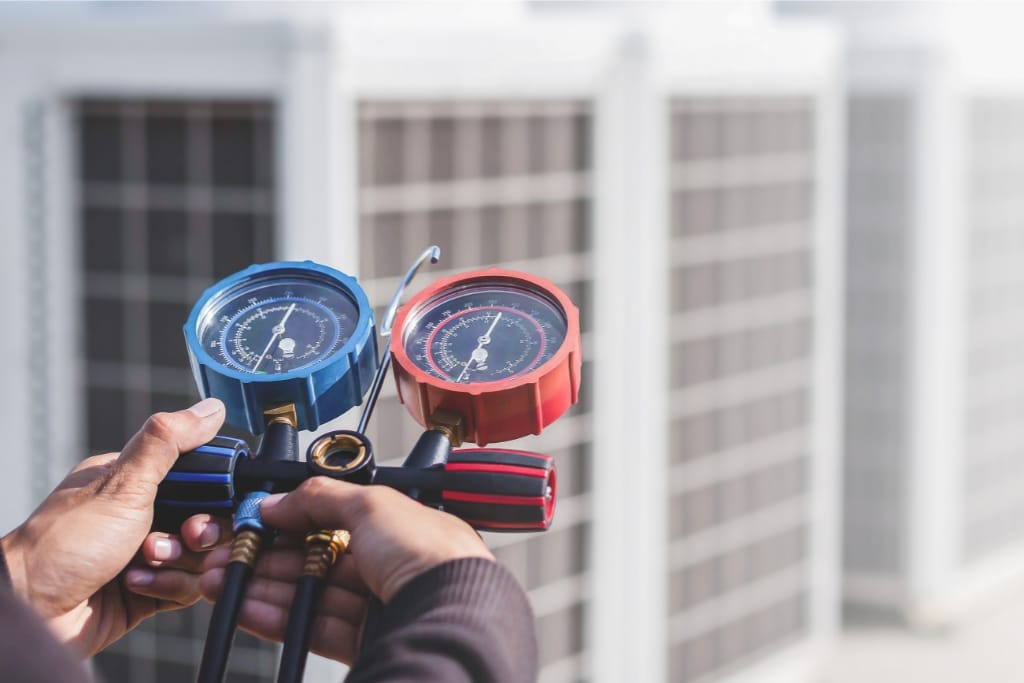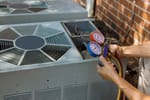Buying a new HVAC system can be a big investment for homeowners. With so many options available in the market, it can be overwhelming to choose the right one that fits your needs and budget.
The task of buying an HVAC system may seem daunting, but with the right guidance, it can be a smooth process.
In this short guide, we’ll list down some expert tips on how to buy the right HVAC system for your home.
1)) Get The Size Right
The first and foremost thing to consider while buying an HVAC system is to get the right size.
An oversized system will consume more energy, leading to inflated energy bills, while an undersized system may not be able to cool or heat your home properly.
Consult a professional who can guide you on getting the right-sized HVAC system for your home.
Tips to Ensure the Right Size of Your HVAC System:
- Consult a Professional: Don't guess the size of the HVAC system you need; engage a professional who can assess your home's size, layout, and insulation levels to determine the right HVAC size for efficient functioning.
- Consider Your Region's Climate: Your location’s climate can greatly impact the size of the HVAC system you need. For instance, if you live in a region with high temperatures, you might need a larger system to efficiently cool your home.
- Factor in Future Home Improvements: If you plan on making any home improvements, like adding an extra room, factor those in when determining the size of your HVAC. This will prevent the need for an upgrade soon after your initial installation.
Getting the size right is one of the most crucial steps when buying an HVAC system.
It's not just about purchasing a unit; it's about making a thoughtful investment that aligns with your home's specific needs.
Consult with a professional, take your regional climate into account, and consider any planned future home improvements.
With these considerations, you'll be well on your way to choosing an HVAC system that provides efficiency and comfort in the long term.
2)) Compare Efficiency Ratings
Efficiency ratings of HVAC systems can vary, and it's important to compare different models to find out which one is more efficient.
Look for systems with ENERGY STAR certification, as these systems are known for being energy-efficient and cost-effective in the long run.
Tips to Effectively Compare Efficiency Ratings:
- Understand Efficiency Ratings: Familiarize yourself with terms like SEER (Seasonal Energy Efficiency Ratio), AFUE (Annual Fuel Utilization Efficiency), and HSPF (Heating Seasonal Performance Factor). These ratings indicate how efficiently the HVAC system uses energy.
- Look for ENERGY STAR Certification: HVAC systems with ENERGY STAR certification meet stringent energy efficiency guidelines set by the EPA and are likely to save you money on utility bills in the long run.
- Consider the Long-Term Savings: While high-efficiency HVAC systems may be more expensive upfront, they can lead to significant savings over time due to reduced energy consumption. Always consider the long-term energy cost savings when comparing efficiency ratings.
Comparing efficiency ratings is a vital step toward choosing the most cost-effective HVAC system.
Understanding efficiency ratings, seeking out ENERGY STAR certification, and considering long-term savings will guide you toward an energy-efficient, economical choice.
An investment in an efficient HVAC system translates to long-term savings and sustainable living.
3)) Check For Rebates And Incentives
Many states and utilities offer rebates and incentives for buying energy-efficient HVAC systems.
Look for such discounts, which can help you save money on the system's initial cost and lower your energy bills.
Tips to Discover Rebates and Incentives for Your HVAC Purchase:
- Research Local Utility Companies: Many utility companies offer rebates for energy-efficient HVAC systems. Check their websites or contact them directly to inquire about available programs.
- Check State Energy Office Websites: Visit your State Energy Office's website to learn about any state-specific incentives for energy-efficient home improvements.
- Explore Manufacturer's Incentives: Some HVAC manufacturers may offer rebates or special financing deals. Check their websites or contact them directly to ask about any current offers.
Seeking out rebates and incentives can significantly reduce your overall investment in an energy-efficient HVAC system.
By researching local utility companies, checking State Energy Office websites, and exploring manufacturer's incentives, you can find ways to make your environmentally conscious choice more affordable.
An upfront investment can lead to substantial long-term savings, making it a win-win for your wallet and the planet.
4)) Consider Maintenance Costs
HVAC systems need regular maintenance to operate efficiently. Ensure that you factor in maintenance costs while buying a new system.
Choosing a system that requires less maintenance can save you money in the long run.
Tips to Factor Maintenance Costs into Your HVAC Purchase:
- Know the Frequency of Maintenance: Generally, HVAC systems need to be serviced at least once a year. Some may require more frequent check-ups. Knowing the frequency will help you forecast the maintenance costs.
- Understand the Cost of Replacement Parts: HVAC systems contain various components that may need to be replaced over time. Check the cost of these parts for your chosen model to estimate future maintenance costs.
- Consider a Maintenance Agreement: Some HVAC companies offer maintenance agreements where they perform regular check-ups and repairs for a fixed annual fee. This can help to spread out the cost and avoid any unexpected bills.
Considering the maintenance costs of an HVAC system is a crucial step towards making a wise, long-term investment.
Understanding the frequency of maintenance, the cost of replacement parts, and considering a maintenance agreement can help you avoid unexpected costs and ensure the longevity of your system.
A well-maintained HVAC system operates more efficiently, providing better comfort and more energy savings in the long run.
5)) Choose The Right Type
HVAC systems come in different types, such as central air conditioning, heat pumps, and ductless systems.
Evaluate your needs and choose the type that best suits your home.
Tips to Help You Choose the Right Type of HVAC System:
- Evaluate Your Home's Characteristics: The size and layout of your home can greatly influence the type of HVAC system that is best. Large homes may require a central air conditioning system, while smaller or multi-level homes might benefit from ductless systems.
- Consider Your Climate: The climate you live in can also determine the ideal HVAC system. For instance, heat pumps are extremely efficient in moderate climates, but may not be the best choice for extreme weather conditions.
- Understand Your Specific Needs: Each type of HVAC system has its benefits. Central systems might offer more powerful cooling, whereas ductless systems offer flexibility and can be more energy-efficient. Evaluate your needs in terms of energy usage, cost, and convenience before making your decision.
Selecting the right type of HVAC system is a matter of understanding your home's unique characteristics, the climate in your area, and your specific needs.
Whether it's a central air conditioning system, a heat pump, or a ductless system, the right choice can provide optimal comfort and efficiency.
The goal is to find a system that not only meets your cooling and heating needs but also promotes energy efficiency for long-term savings.
6)) Look For Features Like Zoning
If you have a large home, you may want to invest in an HVAC system that has zoning capabilities.
A system with zoning capabilities allows you to control the temperature of different areas in your home separately, leading to better comfort and energy efficiency.
Tips to Help You Understand and Choose Zoning Features in HVAC Systems:
- Identify Your Home's Zoning Needs: If your home has rooms that are not used often, or if different family members prefer different temperatures, zoning could be beneficial. Assess your family's lifestyle and comfort needs to determine if zoning would be a valuable feature.
- Understand How Zoning Works: Zoning systems use multiple thermostats and dampers in your ductwork to control the temperature in different areas of your home independently. Familiarize yourself with this mechanism to make an informed decision.
- Consider the Cost-Benefit Ratio: Zoning systems can be more expensive upfront but can lead to significant energy savings in the long run. Evaluate if the potential savings outweigh the initial cost based on your home's size and your family's habits.
An HVAC system with zoning capabilities can provide enhanced comfort and significant energy savings, especially for larger homes.
Identifying your home's zoning needs, understanding how zoning works, and considering the cost-benefit ratio are key steps to making an informed decision.
While the initial cost may be higher, the potential energy savings and improved comfort could make this feature a worthwhile investment in the long run.
7)) Choose The Right Installer
A reputable and experienced installer can ensure that your HVAC system is installed correctly, reducing the chances of future breakdowns and increasing the system's efficiency.
Tips to Help You Choose the Right HVAC Installer:
- Check Credentials and Experience: Ensure the installer has the necessary licenses and insurance. Ask about their experience, especially with the type of system you're planning to install. Experienced installers will have a track record of successful installations and satisfied customers.
- Ask for References or Reviews: A reputable installer will be able to provide references or show positive customer reviews. Speaking to past customers or reading their reviews can give you a sense of the installer's reliability and quality of work.
- Understand their Service and Maintenance Plans: An installer who offers ongoing maintenance services can be a valuable asset. This means they'll be available for regular check-ups and any future repairs that may be necessary, giving you peace of mind about the long-term care of your HVAC system.
Choosing the right HVAC installer is a critical step toward ensuring the efficiency and longevity of your system.
By checking credentials, seeking references, and understanding the service and maintenance plans offered, you can find a reliable and experienced professional.
A good installer not only sets up the system correctly but also provides ongoing support for maintenance and repair, safeguarding your investment in the long run.
8)) Consider Future Upgrades
Technology is always advancing, and HVAC systems are no exception.
Consider investing in a system that can be upgraded easily in the future, which can help you keep up with the latest technology without having to replace the entire system.
Tips to Help You Plan for Future HVAC System Upgrades:
- Research on Emerging Technologies: Stay informed about the latest advancements in HVAC technology. This will help you understand the potential benefits of future upgrades and make a more informed decision when buying a new system.
- Choose a Scalable System: Some HVAC systems are designed to be easily upgraded with new features or improvements. Opt for these scalable systems. They might cost a bit more upfront but can save you from having to replace the entire system when you want to upgrade in the future.
- Consult with Your Installer: Discuss the future upgrade options with your HVAC installer. They can provide valuable advice on what kind of system is most suitable for potential upgrades, taking into account your specific needs and budget.
Considering future upgrades when investing in an HVAC system is a forward-thinking approach that can save you time and money in the long run.
By staying informed about emerging technologies, choosing a scalable system, and consulting with your installer about future upgrade options, you can ensure that your HVAC system stays up-to-date with advances in technology.
This not only enhances the functionality of your system over time but also allows you to enjoy the benefits of new features without the need for complete system replacement.
9)) Look For Extended Warranties
HVAC systems can be expensive, and it's important to protect your investment.
Look for systems that come with extended warranties or buy a separate warranty, which can give you peace of mind in case of any breakdowns.
Tips to Help You Navigate HVAC Extended Warranties:
- Understand the Warranty Terms: Be sure to thoroughly read and understand the terms of the warranty. This will clarify what is covered, for how long, and under what circumstances. Not all damages may be covered, so it's important to know the specifics.
- Compare Warranty Options: Compare warranties offered by different manufacturers. Look at the length of coverage, what is included/excluded, and whether it covers labor costs. This comparison can help you choose the best warranty for your needs.
- Consider an Extended Warranty: An extended warranty can provide additional coverage beyond the standard warranty period. While this may increase the upfront cost, it can potentially save you from expensive repair costs in the future.
Securing an extended warranty for your HVAC system can provide valuable coverage and peace of mind.
By understanding the warranty terms, comparing different options, and considering an extended warranty, you are ensuring the longevity of your system and protecting your investment against potential future repair costs.
An extended warranty is not just about cost-saving; it's about having the reassurance that your HVAC system, a crucial component of your home comfort, is well-protected.
10)) Check The Noise Level
The noise level of an HVAC system can impact your home's comfort level.
While buying a new system, check the noise level, and choose a system that operates silently, which helps reduce background noise and enhances the overall comfort of your home.
Tips to Help You Check the Noise Level of Your HVAC System:
- Check the Decibel Rating: Most HVAC systems list their noise level in decibels (dB). A lower dB rating means a quieter system. As a reference, a whisper is about 30 dB, and normal conversation is about 60 dB.
- Ask for a Demonstration: If possible, ask the retailer or installer for a demonstration of how the HVAC system sounds when it's running. This can give you a clearer idea of the noise level.
- Consider Noise-Reducing Features: Some HVAC systems come with noise-reducing features such as insulated compressor compartments or vibration isolators. These can significantly reduce the operating noise of the system.
Considering the noise level of an HVAC system is essential in maintaining a comfortable and peaceful home environment.
By checking the decibel rating, asking for a demonstration, and considering noise-reducing features, you can ensure you choose a system that operates quietly.
Investing in a low-noise HVAC system not only enhances your home's comfort but also contributes to a better quality of life by reducing unnecessary background noise.
Conclusion
Buying a new HVAC system can be a significant investment, but it doesn't have to be overwhelming.
By considering the tips mentioned in this blog, you can make an informed decision and choose a system that fits your needs and budget.
Remember to consult a professional, compare efficiency ratings, consider maintenance costs, choose the right type, and look for features like zoning.
Investing in an energy-efficient HVAC system can save you money in the long run, and with the right installer and warranties, you can protect your investment for years to come.
Related Articles and Guides
- How To Save On HVAC Install Costs
- 10 FAQs About How To Save On HVAC Installation
- 10 HVAC Energy Saving Tips For Homeowners
- HVAC Buying Guide For Homeowners
Download Our Free E-book!








